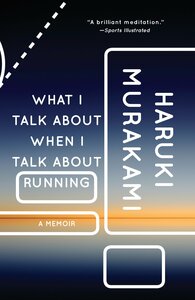Take a photo of a barcode or cover
The book was fast paced and easy to read due to the journal entry format. I liked that his perspectives on running and writing weren’t pessimistic nor insanely optimistic rather they were pretty much just reasonable. I almost found this more inspiring in terms of wanting to progress my own running.
However, I find him to have some mysoginistic tones when he did on the off chance speak of women. Also even though the book is formatted to be more casual journal style, sometimes I found it to be repetitive and lacking a lot of direction.
However, I find him to have some mysoginistic tones when he did on the off chance speak of women. Also even though the book is formatted to be more casual journal style, sometimes I found it to be repetitive and lacking a lot of direction.
informative
inspiring
medium-paced
adventurous
hopeful
inspiring
reflective
fast-paced
This slim volume is partly a guide to training for long distance running, part memoir of a writer’s life and career, part zen philosophy of life and death. I’ve heard it repeatedly described as “intimate” and “thoughtful” and it is both of these things, yet also it is more.
For someone who hates to run, I sure have read a lot about long distance running lately. I read Scott Jurek’s ultramarathon running memoir/vegan cookbook, I’ve read more articles about the sport than I can count - partially because I’m trying to understand my husband (who loves running) but partially because I’m trying to understand other things, about life, discipline and repetition as the path to greatness in any of life’s pursuits, athletic or not.
While I am not a fan of running, I am a fan of stories that tell of human will and triumph, and I am a great fan of Murakami, so I was drawn to this book. It seemed inevitable that I should read it and the changing of the year always brings with it for me a more focused than usual contemplation of discipline, of goals and will.
Murakami draws some fairly obvious parallels here between the lonely, plodding labors of long-distance running and regular novel-writing. (This book makes a good companion to Stephen King’s “On Writing” which I also recently read and enjoyed.) The marathons and triathlons for which Murakami trains and in which he competes provide some narrative flow and shape. But I would tell you not to read this book for the narrative, and not even for the autobiographical insight into Murakami (how he became a writer, how he and his wife sold their successful bar and changed their lives with calm-eyed purpose).
Read this book for the unexpected beauty of its sentences, for the small bits of descriptive genius that Murakami creates so often. The small wry jokes, the delightful insistence on personifying objects. Though some reviewers have complained about his stubborn vagueness, it’s clear to me that when he says something is “pretty good” or that he is “kind of naive” or that his leg felt “really painful” or some similarly terse and boring statement, it’s deliberate. And he is unrelentingly Japanese in his subtle deliberateness. If he unleashed all the words in his vocabulary at all times, we wouldn’t notice the most wonderful bits, where every word is so easily, perfectly placed, where every small choice matters.
These are few of my favorite moments:
From chapter 6: “I had plenty of desire to run, but my legs had their own opinion about this."
“I’m a piece of machinery. I don’t need to feel a thing. Just forge on ahead."
“[One] of the privileges given to those who’ve avoided dying young is the blessed right to grow old. The honor of physical decline is waiting."
From chapter 7: “Has the dark shadow really disappeared? Or is it inside me, concealed, waiting for its chance to reappear?"
From chapter 9: “The sad spreadsheet of my life that reveals how much my debts far outweighs my assets."
As I review these scraps I find they do not quite retain their magic or meaning all alone, excerpted here, the spell broken. I also find I can’t quite describe what makes Murakami’s particular way of speaking and writing so special to me. If you do not like Murakami, perhaps this book is not for you. I do not like running, but this book delighted and touched me to the core.
For someone who hates to run, I sure have read a lot about long distance running lately. I read Scott Jurek’s ultramarathon running memoir/vegan cookbook, I’ve read more articles about the sport than I can count - partially because I’m trying to understand my husband (who loves running) but partially because I’m trying to understand other things, about life, discipline and repetition as the path to greatness in any of life’s pursuits, athletic or not.
While I am not a fan of running, I am a fan of stories that tell of human will and triumph, and I am a great fan of Murakami, so I was drawn to this book. It seemed inevitable that I should read it and the changing of the year always brings with it for me a more focused than usual contemplation of discipline, of goals and will.
Murakami draws some fairly obvious parallels here between the lonely, plodding labors of long-distance running and regular novel-writing. (This book makes a good companion to Stephen King’s “On Writing” which I also recently read and enjoyed.) The marathons and triathlons for which Murakami trains and in which he competes provide some narrative flow and shape. But I would tell you not to read this book for the narrative, and not even for the autobiographical insight into Murakami (how he became a writer, how he and his wife sold their successful bar and changed their lives with calm-eyed purpose).
Read this book for the unexpected beauty of its sentences, for the small bits of descriptive genius that Murakami creates so often. The small wry jokes, the delightful insistence on personifying objects. Though some reviewers have complained about his stubborn vagueness, it’s clear to me that when he says something is “pretty good” or that he is “kind of naive” or that his leg felt “really painful” or some similarly terse and boring statement, it’s deliberate. And he is unrelentingly Japanese in his subtle deliberateness. If he unleashed all the words in his vocabulary at all times, we wouldn’t notice the most wonderful bits, where every word is so easily, perfectly placed, where every small choice matters.
These are few of my favorite moments:
From chapter 6: “I had plenty of desire to run, but my legs had their own opinion about this."
“I’m a piece of machinery. I don’t need to feel a thing. Just forge on ahead."
“[One] of the privileges given to those who’ve avoided dying young is the blessed right to grow old. The honor of physical decline is waiting."
From chapter 7: “Has the dark shadow really disappeared? Or is it inside me, concealed, waiting for its chance to reappear?"
From chapter 9: “The sad spreadsheet of my life that reveals how much my debts far outweighs my assets."
As I review these scraps I find they do not quite retain their magic or meaning all alone, excerpted here, the spell broken. I also find I can’t quite describe what makes Murakami’s particular way of speaking and writing so special to me. If you do not like Murakami, perhaps this book is not for you. I do not like running, but this book delighted and touched me to the core.
Beautifully crafted pseudo memoir. Murakami reads like a person you would love to sit with and listen to all day. He has a rambling style in this work, but he always comes back around to a central point. Additionally, there are some beautiful moments of wisdom about growing up/aging, writing as a career, and of course, running. I think, through this, I realized that I'm definitely not a runner, but I have much more admiration for those who do.
I’m so glad I read this book at this point in my life. Loved it.
Mixed feeling about this book - I mostly really enjoyed reading it and think he’s an amazing writer, but it really felt like I was reading his personal diary and most of of the stories and takeaways felt very personal and less applicable to wider audiences.
adventurous
inspiring
reflective
slow-paced
Originally i rated this a 2.5 but i rounded down later bc it was so boring
hopeful
inspiring
reflective
medium-paced
Read Harder 2017 (done in 2019) - Read a book about sports



